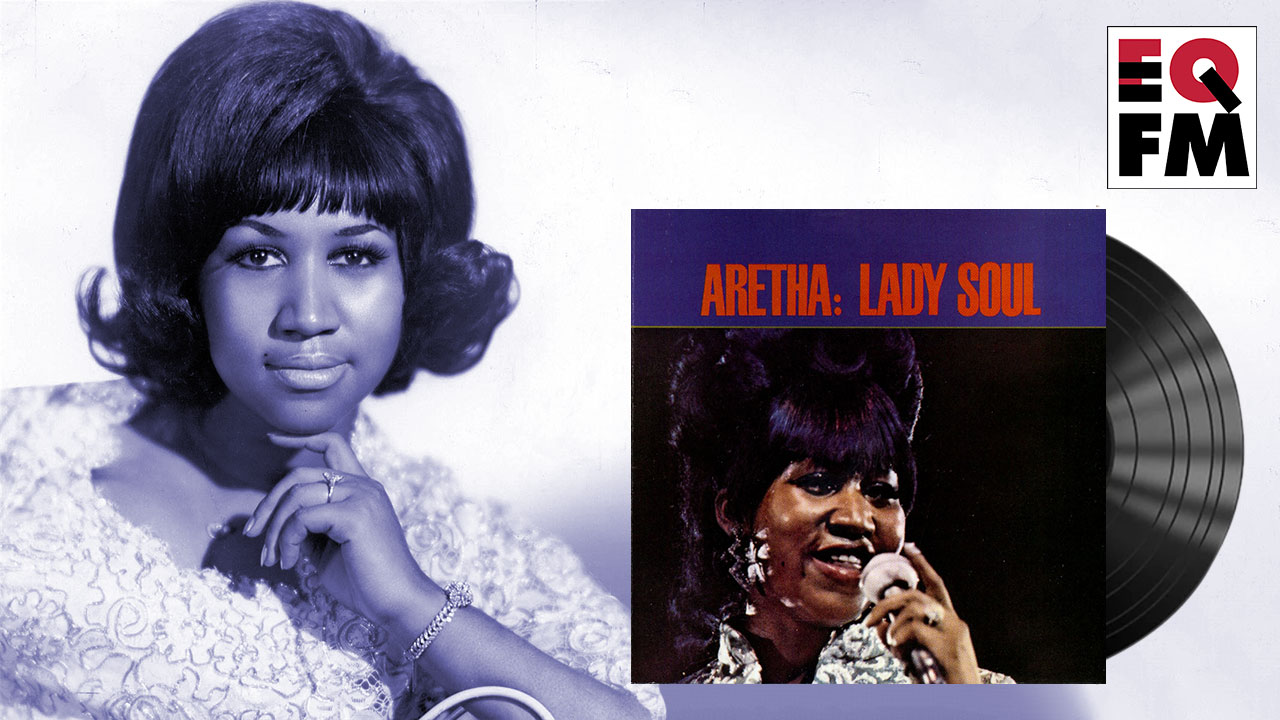Aretha Franklin: Lady Soul

Aretha Franklin (Photo Atlantic Records / Public domain)
Album ReCue, a part of FUV's EQFM initiative, takes an on-air and online look back at influential releases by women that altered our perspective not only of the artist, but her invaluable impact on music history. Above, listen to a conversation with Alisa Ali and Paul Cavalconte about Aretha Franklin's 1968 masterpiece, Lady Soul, and below, Kara Manning's overview.
Aretha Franklin’s 1968 masterpiece Lady Soul, which came out in January of that year, was one of three albums that she released during a traumatic 12-month maelstrom in this nation’s history. Americans desperately needed the sublime supremacy of Franklin’s voice as a life buoy; her heavenly reach to the rafters was a refuge when the Vietnam war, racial injustice, political and cultural divisiveness, and the assassinations of Martin Luther King Jr. and Robert F. Kennedy seemed far too much to bear.
Aretha preached and showed us how to survive that existential heartbreak — and we thankfully paid attention. Her ascent as a superstar was slowly accelerating after nearly a dozen albums, especially after she signed to Atlantic Records in 1966, but Lady Soul was the culmination of that promise. It’s a flawless album. Everything fell together in perfect harmony: the album’s canny, intuitive mix of genres and songwriters (including Franklin herself); the Muscle Shoals magic of the FAME session musicians on board, with Aretha on piano; and starry one-off guests, like 22-year-old Eric Clapton of Cream bringing bluesy guitar licks to “Good to Me As I Am to You.” The Sweet Inspirations (featuring Cissy Houston), Franklin’s sisters Carolyn and Erma, and Ellie Greenwich are Aretha’s angelic chorus of backing vocalists — a sumptuous wall of swagger and sugar, propelling Aretha to the clouds.
But it was Franklin’s tender and towering voice that pushed Lady Soul to paradise. She was all of 25 and for a woman who struggled with her own insecurities (and in a troubled marriage that would dissolve in 1969), she sounded ferociously, delightfully confident: Lady Soul was her passage to pop divinity. Franklin’s lioness snarl reconfigured Don Covey’s “Chain of Fools,” first released as a single in 1967, into a fiery call to arms, whether dealing with an errant lover or the whole damn country (Richard Hawkins’ clattering hi-hat thrillingly underscores Franklin’s restlessness and rage).
Producer Jerry Wexler inspired Carole King and Gerry Goffin to write “(You Make Me Feel Like) A Natural Woman” for Aretha. There’s no argument that it’s one of the most breathtaking performances in Franklin’s career (and in pop history) — but so are two Lady Soul tracks that Franklin co-wrote: the hit “(Sweet Sweet Baby) Since You’ve Been Gone,” an oddly ebullient anthem of abandonment (only Aretha can make a breakup sound so happy), and the lavish lament of “Good to Me as I Am to You,” with Aretha’s turbulent river of sighs and swoons in intimate dialogue with Clapton’s sympathetic guitar runs.
“Nobody embodies more fully the connection between the African-American spiritual, the blues, R. & B., rock and roll—the way that hardship and sorrow were transformed into something full of beauty and vitality and hope,” President Barack Obama told the New Yorker following Franklin's titanic performance for Carole King's Kennedy Center Honors in 2015 (Franklin was honored herself in 1994). “American history wells up when Aretha sings. That’s why, when she sits down at a piano and sings ‘A Natural Woman,’ she can move me to tears—the same way that Ray Charles’s version of ‘America the Beautiful’ will always be in my view the most patriotic piece of music ever performed—because it captures the fullness of the American experience, the view from the bottom as well as the top, the good and the bad, and the possibility of synthesis, reconciliation, transcendence.”
Lady Soul offers comfort in an equally turbulent 2020 too. The hands-in-the-air revival shimmy of “Come Back Baby,” the civil rights reckoning of Curtis Mayfield’s “People Get Ready,” and the summer-on-the-stoop warmth of the Rascals’ “Groovin’” are soothing salvation when hope and heartbreak are running relentlessly in tandem. Franklin might have shielded her own suffering from prying journalists, but her songs were oceans of empathy and resilience.
"What I’m singing is everyday music for most people," she told Vanity Fair in 1994, "Things that relate to our hearts, our everyday life, what we do every day, and I truly am everyday people offstage."
Listen
WFUV's EQFM Album ReCue: Aretha Franklin's Lady Soul

